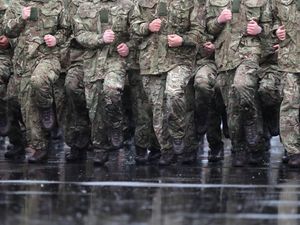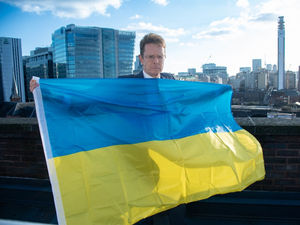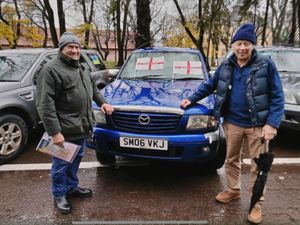Ukraine ceasefire reports welcomed but little sign of Russian aggression abating
Government minister John Glen said legislation in the Commons on Monday would speed up sanction measures.
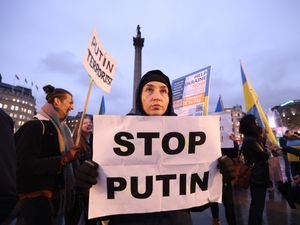
A temporary ceasefire in Ukraine would be welcome but it is only a “small step” with the Russian invasion showing little signs of weakening, a Government minister has said.
John Glen, Economic Secretary to the Treasury, said “the events that are going on in Ukraine are appalling and this is obviously an illegal war that Putin is prosecuting”.
He said that while the ceasefire announced on Saturday morning was welcome, “Putin’s aggression shows little signs of abating”.
It comes as British nationals in Russia were told to leave the country if they do not need to be there, while Russia’s flagship airline Aeroflot announced it will halt all international flights – except to Minsk, Belarus – from March 8 at midnight Moscow time.
An update to the Foreign Office travel advice on Saturday said: “If your presence in Russia is not essential, we strongly advise that you consider leaving by remaining commercial routes.”
According to the Russian Tass news agency, the country’s defence ministry said it had agreed on evacuation routes for civilians with Ukrainian forces in Mariupol in the south east and the eastern town of Volnovakha.
There was no immediate confirmation from Ukrainian forces, but reports suggested the ceasefire had not been upheld in Mariupol.
Mr Glen, whose Salisbury constituency was hit by the Russian-backed Novichok attack four years ago, said that “anything that can assist the people of Ukraine the Government will support”.
“But (the) big picture is that Putin’s aggression shows little signs of abating and the humanitarian crises that are unfolding are appalling and they are entirely his responsibility,” he said.
“The number of cities that are apparently under threat remain high and the level of the aggression and the nature of the shelling is becoming more and more desperate and indiscriminate as each day goes by.”
Ukrainian president Volodymyr Zelensky has again called on Nato to impose a no-fly zone over his country, warning that “all the people who die from this day forward will also die because of you”.
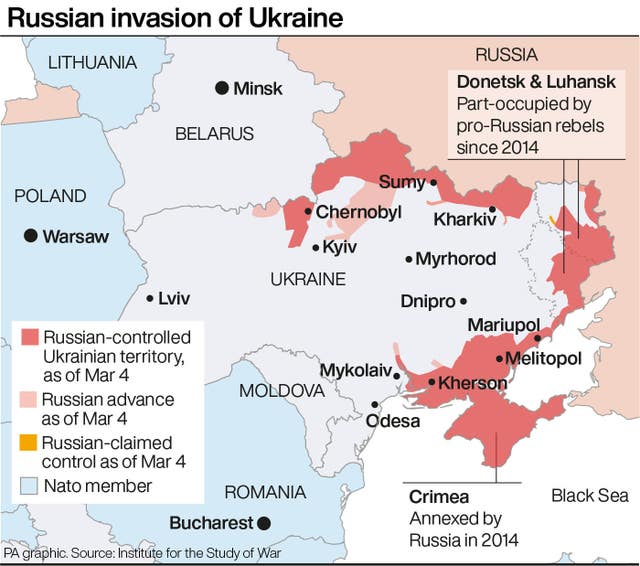
But the defensive alliance has refused to do so, over fears it would prompt an all-out war with nuclear-armed Russia.
On Friday night, Prime Minister Boris Johnson warned of the threat of nuclear disaster in Europe following the Russian shelling of a Ukrainian power plant.
In an interview with foreign newspapers, the Prime Minister described the moment he was woken in the middle of the night to the news of the attack on the Zaporizhzhia nuclear site.
“We remember what happened with Chernobyl, the radioactive clouds spread over the whole continent, and indeed, also to North America, as far as I can remember,” he said.
“There is clearly a risk… I am concerned about how we stop a disaster: there are other Ukrainian plants and there are certainly other Ukrainian radioactive nuclear waste sites.”
Later, in a video message on Twitter, the PM reiterated that “however long it takes, however arduous, Putin must fail”.
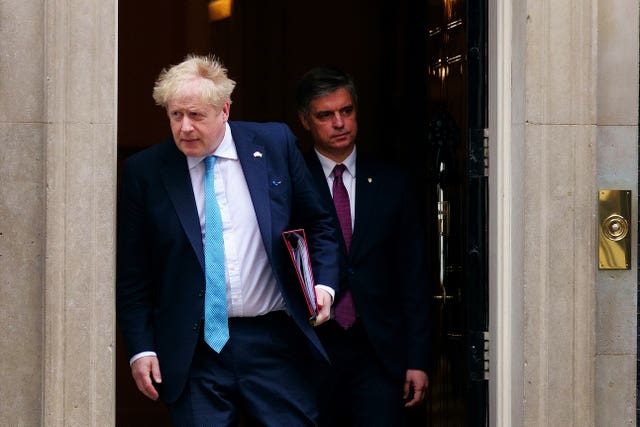
Mr Johnson argued that “the world is turning its back on Putin and his regime”, with “nation after nation” taking a stand.
“The vice is tightening its grip, and it will continue to tighten,” he said.
The UK Government will attempt to put further pressure on the Kremlin on Monday, with new amendments to the Economic Crime Bill aiming to speed up the process of sanctioning individuals.
The changes include shortening the length of time foreign owners of UK property will be given to declare their true identity as part of a new register of overseas entities, from 18 months to six months.
A further amendment will increase criminal penalties for non-compliance from fines of up to £500 per day to up to £2,500 per day.
Speaking to BBC Radio 4’s Today programme, Mr Glen said: “What we’re trying to do is make it more straightforward to get a legal basis to move on these individuals. We believe that these changes will make that difference.
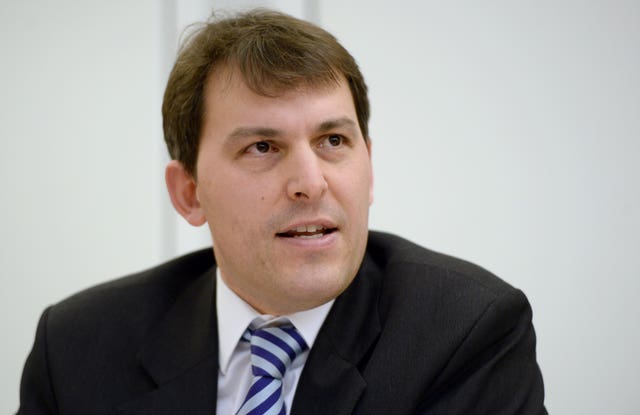
“In this situation, we need to look at how we can expedite these decisions more swiftly.”
Mr Glen said he also agreed with Levelling Up Secretary Michael Gove that the Government should be able to seize the properties of sanctioned people.
Senior Conservative Tom Tugendhat welcomed the amendments put forward by the Government, and said Vladimir Putin had turned Russia into “an organisation rather more akin to a gangster group or a mafia outfit”.
The chairman of the Commons Foreign Affairs Committee said he wanted to see a tribunal modelled on the Nuremberg trials after the Second World War to hold the Russian leader and his associates to account.
He said this would be a “step further” than the investigation announced by the International Criminal Court (ICC), which he said would focus on war crimes.
“What we’re seeing in Ukraine today is not just the result of a crime but actually of an entire conspiracy,” he said.
Mr Glen was also asked about the Novichok attack on his city, and although he said the invasion of Ukraine was of an “utterly different scale”, he added that on Mr Putin “in terms of the character of the man, clearly that was demonstrated in what he did to my constituents, the destruction he brought to our way of life here in Salisbury”.
“But where we are now in the Ukraine is just another manifestation of somebody who is beyond democratic accountability and is prosecuting an illegal war that is going to greatly damage both his people, the economy of Russia, but also the people of the Ukraine’s way of life,” he said.
The latest intelligence released by the Ministry of Defence said that the “overall rate of Russian air and artillery strikes observed over the past 24 hours has been lower than in previous days”.
The update, posted on Twitter, said Ukraine continues to hold Kharkiv, Chernihiv and Mariupol and there have been reports of street fighting in Sumy.
“It is highly likely that all four cities are encircled by Russian forces,” the update said.
“Russian forces are probably advancing on the southern port city of Mykolaiv. There is a realistic possibility that some forces will attempt to circumvent the city to prioritise progression towards Odesa.”


